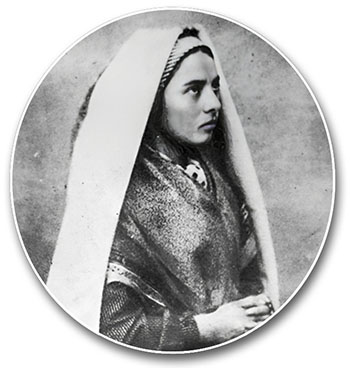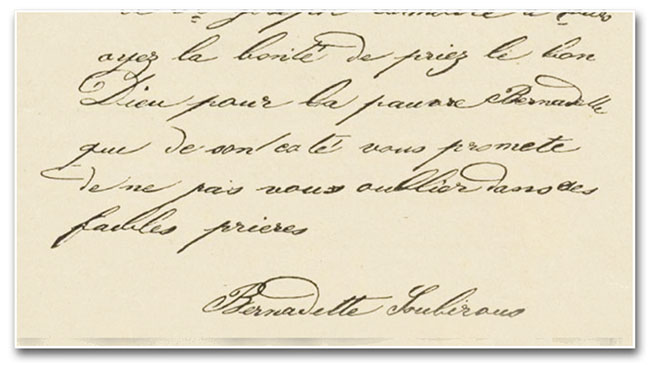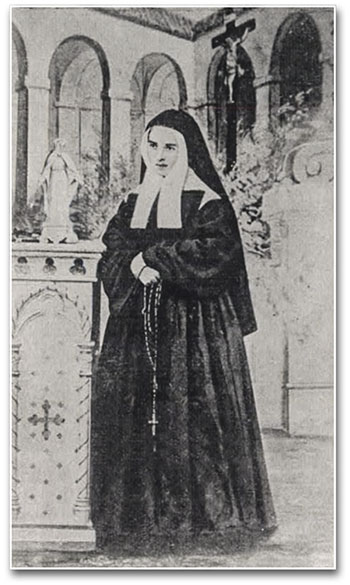It is impossible to think of the city of Lourdes today without associating it with the striking image of the shrine, overflowing with faithful who come there to implore a favour or a grace from God through His Blessed Mother. But the reality was quite different on February 11, 1858, when Our Lady appeared for the first time to Bernadette Soubirous.
The hard lot that usually accompanies the lives of those invested with a supernatural mission is that incomprehension and ingratitude are the coin in which they are paid, on this earth, for carrying out their charge. After all, what criminal endured more interrogations, as exhausting as they were endless, than the timid and vulnerable child that was Bernadette? What dramas, setbacks and struggles did she not have to undergo in order to make public the call to conversion and the practice of penance, according to the express wish of the Lady dressed in white who visited her in the Grotto of Massabielle?

The letters, personal notes and copies of various texts of St. Bernadette reveal to us a little of her “spiritual way”, that is, the sinuous inner paths along which Providence led her in order to accomplish a sublime mission. Once we have drawn back certain veils from this soul so dear to God and Our Lady, we will be able to get to know her more deeply, so as to better imitate her virtues.
Psychological characteristics of Bernadette Soubirous
As a starting point, let us focus our attention on a detail which, to anyone endowed with an incipient sense of graphology, causes surprise and admiration: the psychological aspects outlined in her very regular and stable handwriting, characterized by the constant pressure of the firm and slanted pen, which does not fail to form the words elegantly.
At one and the same time, St. Bernadette’s handwriting expresses various qualities which, a contrario sensu, contradict a certain unilateral and erroneous vision which aims to stigmatize the young woman as an inept or ignorant person. If her writings were dotted with grammatical lapses until the end of her life, this did not prevent her decisive and balanced character from finding expression in her writing. Thus, a sense of setting high ideals for herself, along with self-criticism is latent in her beautiful script.
In addition, Bernadette’s handwriting reveals her affective inclination, that of someone overflowing with generosity and love for others, very sensitive to the treatment she received. It is no wonder that, at the sight of a child, a bond was immediately established that encouraged them to approach her, to the point where little ones would flock around the seer…

Finally, her penmanship suggests a penchant for solitude, perhaps because she did not find in others the models of virtue and rectitude she set for herself and sought after with such determination.
A plan of life expressed in her personal journal
It is worth pointing out that sanctification is not only the fruit of a divine gift; the conquest of holiness involves a constant struggle, from which not even the great mystics are exempt. On the contrary, God requires of his friends an uninterrupted and generally very difficult renunciation. When properly analysed, the spiritual itinerary of these chosen souls turns out to be so – one might say – “normal”, and “ordinary”, that it fills everyone with hope.
In one of her little notebooks of personal reflections, the title of the book sums up the plan she had outlined: “Always do what costs more.”1 In this light, Bernadette traced out for herself some goals which show her seriousness and persistence in the search for perfection, beginning with points related to the interior life:
“1) Never be discouraged; see God’s holy will in everything that happens to me, thank Him for everything, thinking that it is for my greatest good that He permits it.
“2) Work to make myself indifferent to whatever my superiors or my companions say or think of me; detach myself from everything, to dedicate myself solely to pleasing God and saving my soul. To remember often this saying: ‘God alone is good, and from Him alone do I expect my reward’;
“3) Never make personal friendships, love all my sisters only to please God.”
“A good nun must ask God…”
Thanks to this virtuous conduct, embraced from the time Our Lady confided to her the first yearnings at Massabielle, the seer was able to sum up holiness in a few short phrases, pervaded with both theology and charity, and applicable to any baptized person who aspires to reach Heaven:
“A good nun must ask God for:
More humility than humiliation,
More patience than suffering,
More will than works,
More love than actions,
More surrender than orders,
More acts than words,
More application to sanctity than to health.”
And still in this vein, with the aim of clarifying for herself – and for the future – the axis around which the daily life of a consecrated soul must revolve, the Saint would affirm:
“A religious must live in mortification like a fish in water; it is not the same when a religious is not mortified. Serious application to all duties necessarily leads to the exercise of continual mortification at all times. If one does not mortify oneself, duty is lacking. Where do the violations of the rule and the vows come from? Where does the laxity of some communities come from? They come from not putting into practice or not maintaining the exercise of mortification. […] In my opinion, [a mortified sister] could enter Heaven without passing through the flames of Purgatory!”
Drawn to a humble and hidden life
As for her humility, an illustrative fact occurred between her and a certain sister of in the same community, Josephine. Since Bernadette, due to her temperament, reacted strongly in everyday relationships and conversations, she ended up by offending her. Having left the said sister, she realized her imperfection in not being more careful of the latter’s “sensitivity” and returned to apologize to her with the following note:
“My good Sister Josephine,
“I beg your pardon for the bad example I have given you, as well as for all [my] unedifying actions.
“Please forgive me and pray a little for me; you see how poor I am in virtue.”
This search for true humility grew stronger throughout Bernadette’s earthly life, as a certain prayer she wrote in one of her personal notes proves:
“My Divine Spouse gave me an attraction for the humble and hidden life, and often told me that my heart would stop only when I had sacrificed it to Him entirely. And to convince me, He often inspired me that, in the end, at the hour of death, I would have no other comforter but Jesus, and Jesus crucified. He alone, faithful friend, I will carry between my icy fingers in my tomb. O madness of madness, to cling to anything but Him.”
Lessons from the transcribed texts
It is interesting to note a certain custom that Bernadette adopted, of unknown origin but nonetheless praiseworthy: amidst her numerous writings, she took pains to copy entire books of meditations! It would seem that, given her regime of religious poverty, she could not keep in her possession the books belonging to the convent library, so the Saint found no better solution than to copy them…
Among these texts artistically transcribed by the French Saint, there is a letter of St. Jeanne de Chantal to St. Francis de Sales: “O Lord Jesus, I have no choice, play on the strings of my lute what pleases You; always and forever only this one harmony will sound: Yes, Lord Jesus, no ifs and buts, and no exceptions… Fiat in all things and in me.”
In fact, from her fiat, Providence chose Bernadette, though unknown and shut away in a convent, to be a living and valuable lesson of what Lourdes was to mirror for the whole world: the miracle of accepting pain, suffering and even defeat and failure, if necessary.
If we are astonished to learn that a young girl had been chosen to be the spokeswoman of the Immaculate Conception, to found the world’s most prolific pilgrimage site for miracles, we should be equally enthusiastic about her austere life, punctuated with so many privations of licit things.
But that is not what seems to happen. When we look around us and consider the miseries of human nature fallen through original sin, we realize that such an act of self-giving and abnegation is far removed from our selfishness, causing us only a timid admiration, or even a certain aversion.
We would rather believe that the sanctity of Bernadette and of so many other holy people was rather a purely divine gift, alien to the concourse of the disciplined will and to the exercises of virtue.
It is clear that sanctification is a gratuitous favour from God, but this should not give rise to the false idea that He does not desire our active participation in its attainment, since life is warfare.

Spirituality full of light and equilibrium
Therefore, if Bernadette’s private notes clearly reveal her confidence, and the copied writings suggest her preferences and profound choices, her letters deserve special attention. They touch the soul deeply, for they express the dominant virtues of this spirituality full of light and equilibrium: humility and faith.
One example will suffice to prove it: the letter addressed to Pope Pius IX, at the request and insistence of a prelate, Bishop Ladoue, dated December 17, 1876:
“Most Holy Father,
“I would never have dared to take up the plume to write to Your Holiness, I, a poor, little sister […]. I was afraid, at first, of being too indiscreet; then it occurred to me that Our Lord likes to be bothered by the little as well as the great, the poor as well as the rich, and that He gives himself to each one of us without distinction. This thought gave me courage, so I no longer fear; I come to you, Holy Father, like a poor child to the most tender of parents, full of abandonment and trust.
“What can I do, Most Holy Father, to bear witness to you of my filial love? I can only continue to do what I have done up to now, that is, suffer and pray. Some years ago I made myself, though unworthy, Your Holiness’s little Zouave2; my weapons are prayer and sacrifice, which I will keep until my last breath. Only the weapon of sacrifice will be left behind, but the weapon of prayer will follow me to Heaven, where it will be much more powerful than in this land of exile.”
Who could doubt that the spiritual path of St. Bernadette was summed up in these two verbs, to suffer and to pray?
Her life attests to the fact that only prayer and suffering were capable of guaranteeing her stability in the practice of virtue, even when she was met with misfortune and misunderstandings over the course of her earthly pilgrimage.
The testimony of a life: the greatest miracle of Lourdes
It is not without reason that one of the criteria of prudence adopted by the Church in verifying the authenticity of particular revelations, such as those which Bernadette received, consists in carefully and meticulously analysing the conduct of the seers: the decisive testimony will be that of their life.
Even more than being a herald of the supernatural and a herald of the Virgin by her words, Bernadette took on her mission to such a degree, configuring herself to it, that her life became a call to conversion at least as effective as the miraculous waters that bathe the Grotto of Lourdes; her death, an invitation to penance; and her body, almost untouched by the decomposition caused by the evils of original sin, a sign of the glory bestowed on her once the threshold of her earthly pilgrimage was crossed.
Thus, from April 16, 1879, the day of her death, until the present day, St. Bernadette remains for all Christendom an instrument of the maternal tenderness of Mary “and of the merciful power of her Son, to restore the world in Christ through a new and incomparable outpouring of the Redemption.”3
St. Bernadette, pray for us! ◊
Notes
1 All quotations from the seer transcribed in this article were taken from the work: SŒURS DE LA CHARITÉ DE NEVERS. Les écrits de Sainte Bernadette et sa voie spirituelle. Paris-Lourdes: P. Lethielleux; Œuvre de la Grotte, 2003.
2 The expression evokes the dedication and sacrifice of the Papal Zouaves in the struggles for the Papal States in those decades of the 19th century.
3 PIUS XII. Le pèlerinage de Lourdes, n.10.


